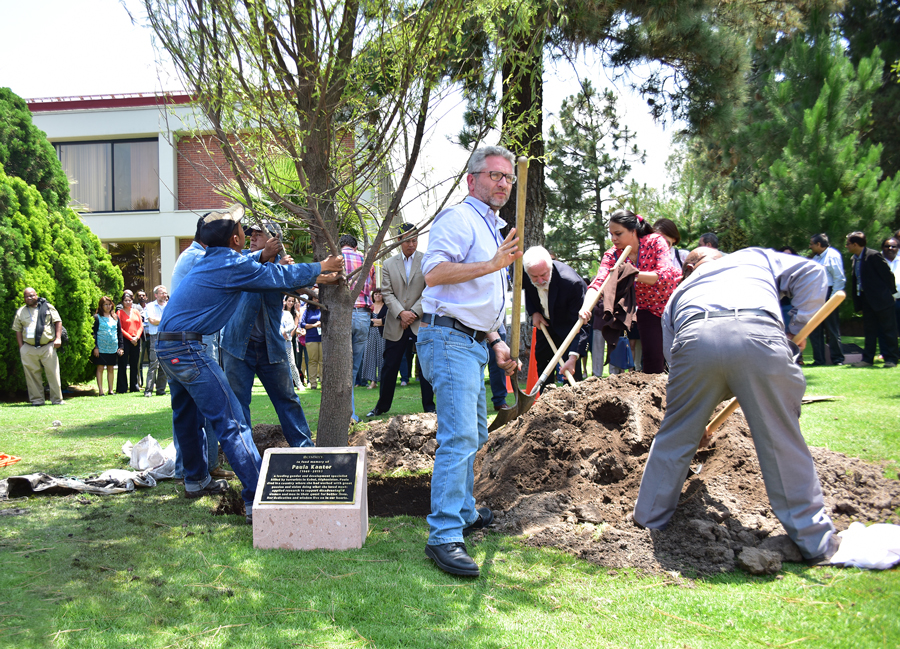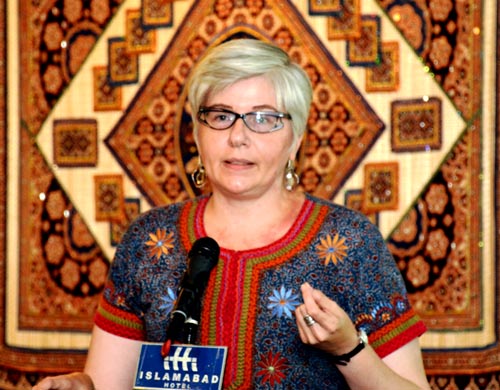Africa
CIMMYT’s work in Africa helps farmers access new maize and wheat systems-based technologies, information and markets, raising incomes and enhancing crop resilience to drought and climate change. CIMMYT sets priorities in consultation with ministries of agriculture, seed companies, farming communities and other stakeholders in the maize and wheat value chains. Our activities in Africa are wide ranging and include: breeding maize for drought tolerance and low-fertility soils, and for resistance to insect pests, foliar diseases and parasitic weeds; sustainably intensifying production in maize- and wheat-based systems; and investigating opportunities to reduce micronutrient and protein malnutrition among women and young children.
Maize that packs a punch in face of adversity: unveiling new branded varieties for Africa
 Climate adaptation and mitigation
Climate adaptation and mitigation
Strengthening seed production capacity in Malawi
 Capacity development
Capacity development
CIMMYT designed and gave an integrated maize seed systems training course for 32 seed technicians from the public and private sectors on 18-22 May at Chitedze Agricultural Research Station. The course is part of CIMMYT’s capacity building initiative to enhance maize seed production in Malawi, established after the successful launch of USAID Feed the Future’s Malawi Improved Seed Systems and Technologies project on 6 May 2015 in Liwonde, Machinga District.
Quality Protein Maize – what’s in a name?
 Nutrition, health and food security
Nutrition, health and food security
Across Ethiopia, farmers bring a different dimension to the age-old tradition of naming children in symbolic and meaningful ways, by assigning a human name to Quality Protein Maize (QPM) that reflects its importance. In some parts of Oromia region, QPM is known as Gabissa, meaning builder, because it is believed to build bodies and make people strong. In the Amhara region, it is known as ‘Almi Bekolo’ or ‘Gembi bekolo, both names meaning building the body. QPM has gained its fame across Ethiopia, as an affordable and viable option to alleviate protein malnutrition and reduce animal feed costs thanks to the CIMMYT’s Nutritious Maize for Ethiopia (NuME) project and many national partners.
The Skywalker Project: soaring to new heights
 Capacity development
Capacity development
Though its name implies science fiction, Skywalker’s results have been incredibly real. A small, unmanned aerial vehicle equipped with remote sensing devices, Skywalker flies over maize fields collecting images and data. It is able to measure several hundred plots in one take. Spectral reflectance and thermal imagery cameras on its wings allow scientists to conduct non-destructive screening of plant physiological properties such as crop growth and water use, at enough resolution to obtain information at plot level.
In fond memory of Paula Kantor (1969-2015)
 Gender equality, youth and social inclusion
Gender equality, youth and social inclusion
Paula had an exceptionally sharp, analytical mind and a deep understanding of how change can empower men and women to give them a better chance to influence their own lives and choose their own path.
For development expert Paula Kantor, gender equality was crucial
 Gender equality, youth and social inclusion
Gender equality, youth and social inclusion
Gender and development specialist Paula Kantor had a deep understanding of how change can empower men and women to give them greater control over their own lives.
Conservation agriculture in Africa: where does it fit?
 Innovations
Innovations
The controversial debate among researchers about the suitability of conservation agriculture for smallholder farmers in Africa continues while millions face food insecurity and degrading resources.
SUPER WOMAN: Jeanie Borlaug Laube unites global wheat community
 Gender equality, youth and social inclusion
Gender equality, youth and social inclusion
Seeds for needs in Malawi
 Climate adaptation and mitigation
Climate adaptation and mitigation
The United States Agency for International Development (USAID) and the Government of Malawi launched five projects on food security, fisheries and environment.
CIMMYT remembers vital legacy of gender specialist Paula Kantor
 Gender equality, youth and social inclusion
Gender equality, youth and social inclusion
CIMMYT is sad to announce the tragic death of our friend and respected colleague, gender and development specialist Paula Kantor.
“In Mozambique, you cannot talk about food security without talking about maize”
 Nutrition, health and food security
Nutrition, health and food security
MLN diagnostics and management in Africa through multi-institutional synergies
 Nutrition, health and food security
Nutrition, health and food security
Two-wheeled tractors key to smallholder mechanization in Africa
 Capacity development
Capacity development
The Farm Mechanization and Conservation Agriculture for Sustainable Intensification (FACASI) project held its second review and planning meeting, as well as mid-term review, during a five-day event in Hawassa, Ethiopia. This was followed by country site visits by the review team.
Ethiopian seed companies express interest in QPM, seek CIMMYT support
 Capacity development
Capacity development
Managers of private and public seed companies in Ethiopia have expressed interest to produce and broadly market quality protein maize (QPM) seed, provided that they get technical and other necessary support from the Nutritious Maize for Ethiopia (NuME) project.

